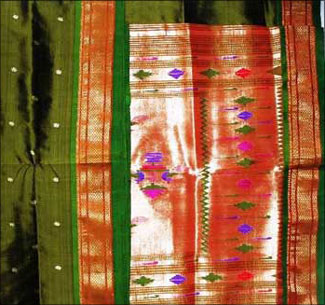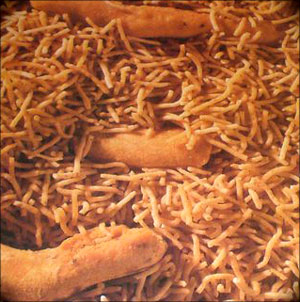
Maharashtra and Andhra Pradesh share registration of three items each by the Registrar of Geographical Indications this year to provide recognition of the intellectual right of producers and artisans on them.
These are: Paithani sarees and fabrics, Mahabaleshwar strawberry and Nashik valley wine of Maharashtra, as also Hyderabad Haleem, Guntur Sannam chilli and Gadwal sarees.
Other items that got the recognition are: Bikaneri bhujia of Rajasthan, Kinnauri shawl of Himachal Pradesh, Kasaragod and Kuthampully sarees of Kerala, Sandur Lambani embroidery of Karnataka, and Bhadohi's handmade carpets of Uttar Pradesh.
. . .

Altogether 132 items have been given the trade mark in India since inception in 2004 when Darjeeling tea became the first certificate as the registered GI (geographical indicator).
India, as a member of the World Trade Organization, enacted the Geographical Indications of Goods (Registration & Protection) Act, 1999 that came into force from September 15, 2003.
The GI certificate provides recognition to the origin of a product and such a certificate conveys an assurance of quality and distinctiveness essentially attributed to the fact of its origin in that defined geographical locality, region or country.
. . .

Under Articles 1 (2) and 10 of the Paris Convention for the Protection of Industrial Property, geographical indications are covered as an element of intellectual property rights (IPRs).
They are also covered under Articles 22 to 24 of the Trade Related Aspects of Intellectual Property Rights (TRIPS) Agreement, which was part of the Agreements concluding the Uruguay Round of GATT negotiations.
Some of the other items that found recognition as distinguished items of particular regions over the years include feni of Goa, Tirupati laddu, Kashmiri Pashmina shawl, Kashmiri Kani shawl, Kashmiri Sozani craft, Jaipur's blue pottery, Molela clay work, Kota Doria, Sanganeri hand-block printing and kathputlis of Rajasthan, Kangra tea of Himachal Pradesh, Mysore sandal soap and sandalwood oil, Mysore Ganjifa cards, bronzeware and Mysore betel leaf of Karnataka, Kutch embroidery, Agates of Cambay, Tengaliya shawl and Sankheda furniture of Gujarat and Lucknow chikan craft of Uttar Pradesh.